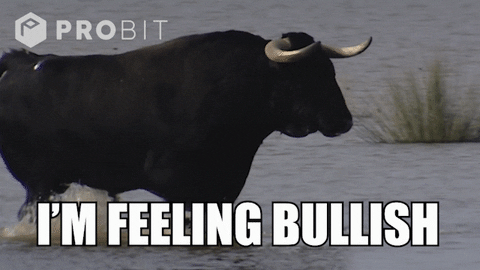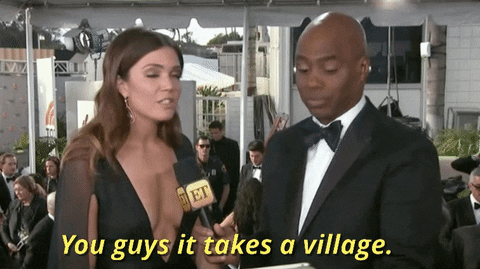Back to Basics: Community is THE foundation for Health... and Healthtech
The community opportunity - what it is and why you need it
Hands up who has thought community was “not so important”? Easy? Soft?
I know I sure did ✋
Don’t get me wrong, I knew it was valuable. Being a part of the medical community, sports teams, school etc added immeasurable joy to my life. But, like many, I deemed it nothing special or serious, at least compared to the tangible “hard skills” so prized by society.
Boy was I wrong…
Community is the foundation of everything. And it’s back, with force.
I know am insanely biased as it’s what I do for a living (never thought that would be something I said) but I am SO glad to finally see community taking its rightful place as the strategy for business.
Since 2021 has started, suddenly it’s a hot topic I’m getting asked about weekly. So why the sudden shift in interest?
Once a “nice to have”, now with demand for connection and the death of traditional marketing - the only real sustainable option for growth (fight me), community, is not optional.
A lot preach it, but how many truly practice it?
It’s one of those things that is easy said, but very HARD done.
And you can’t fake or force it.
So, let’s dive into what exactly makes up a community, it’s top-notch leaders, and the opportunities it presents in the health space.
❓What Exactly is Community?
Great question... Ask 100 people and you’ll likely get 100 different answers.
Is it just a group of people? Marketing? Events? Content? All of the above?
It’s hard to articulate, and even harder to execute. But Holly Firestone puts it well…


In reality, it is just a group of people, bound by similar interests, values, characteristics, and/or purpose.
But, in its best form… it’s a group that collaborates, contributes, and co-creates to lift each other up, create belonging, and help move closer to their desired goals.
Each community defines itself. And its value.
Social media, events, marketing, and customer service have begun rebranding as “community management”. This isn’t wrong - it’s everything that adds to the magic mix which makes up the foundation behind your biz.
It’s how it represents itself, and the connections and collective value it creates…
Community is EVERYTHING
It’s a long-term strategy that needs to be selfless to truly succeed. And there ain’t no shortcuts.
They only exist and survive, let alone thrive, if you fill an absolute need or pain point for people. Making their lives better by providing something they can’t live without… Or at least would not want to. Similar to building a killer product.
Communities exist for people to create their own solutions and innovate.
A safe space to listen, be heard, seek information, and, find belonging. And almost always ft. a foundation of trust. And by providing these structures, and empowering people, you will win.
🏗️Rebuilding Trust, Understanding & Connection
Since the dawn of time, human health, wellness, and survival centered around community.
Neighbourhoods operated as codependent units, helping and connecting each other with the physical and psychological supports required. Usually geographically.
Built upon strong relationships, trust, and a few select information sources.
”It takes a village” isn’t a saying for nothing.
To get through the big challenges in life - whether that’s starting a family, a business, or getting through a health scare, these things need support.
With the industrial and digital revolutions, we became a product of mass production, globalisation, and media, resulting in fragmented local networks. Personalisation, and the information influx made people “self-sufficient”. Surviving without the communities which our lives literally used to depend on.
As big corps and capitalism made big strides, so too did marketing, mistrust, and confusion. It wasn’t about people - but progress and business.
When COVID hit, it was the straw that broke the camel’s back. Pushing priority shifts. Isolation combined with confusion, trust hit all-time lows, and despite the peak of digital connection, the need for real community & sustained connection soared.
Now it’s come full circle and pushed us back towards the old way of doing things…
Obviously with a digital spin - Same same, but different.
💵 The Value of Community, Co Creation & Collaboration
Old school structures simply can't provide this, so it’s time for the game to change.
In 2020 we saw systems and institutions clearly failing, and people took control, self-organising to solve problems.
When crises hit, we go back to biologically hardwired instincts and things we need but often slightly neglect. Like the need to feel seen, heard, connected & valued.
With mass access and information, consumers (and the collective public) are demanding more... and want to be involved.
Which we’re seeing in both actions and purchasing decisions. Pushing the shift of power back to people and grassroots movements.
No longer is the creator king - but the consumer and the community which they serve. Old school institutions can’t just win by existing or pushing a product anymore.
And the answer - is community.
🚀 Why Community is the Future

It already rules our worlds through the Facebook empire, Twitch, Reddit, TikTok, Onlyfans, Twitter, and even Substack. With CRAZY (and scary) amounts of power.
Case and point: Elon in the crypto markets & Trump in politics
It’s seeped from social media into every industry. But is still built upon the infrastructure of these external platforms.
The next step… like the rest of tech…
Dispersion… into privately-owned channels.
Angela Strange from a16z said that every company will be a fintech company.
I want to add to that… every company will be a community company
Microsoft, Salesforce, Amazon & Google all are fostering their communities with hefty budgets thrown into partnerships, programs, and even “Community Managers”.
Nike & Lululemon are killer product-led examples who epitomize the power of a strong brand. Proving they do not just represent objects, but instead, a movement based on strong values, brand, and community surrounding their pretty products.
It’s Starting to Happen in Health Too…
Especially in Aus, there’s a long way to go. But the future is bright. Just look at Hims & Hers, Eucalyptus & newbies like Telecare. And this is just the start of the race…
Product loyalty does not exist.
But community, relationships, and (strong) brand loyalty does.
Consumer Centric Brand + Community + UX = Power
As usual, the health industry is last to get on the bandwagon… at least from in the digital and business model sense - at its core, it has always been about community.
But it provides an opportunity for far better care, connection, and support for both patients & professionals. And enormous opportunity for those orgs who jump in and start leading the way.
🔥What’s Hot in the Community Scene?
As we look for the trailblazers in the space, the US (shock) is leading the charge…
On the infrastructure side, platforms like Circle and Mighty Networks enable you to launch your own private community without the FB overlords. They’re in their infancy and yet to be a clear winner, but the race is on and competition is heating up fast 🔥
Many top community-centric businesses like Hopin, On deck & Notion signed the the Community-Led pledge.
CMX is “The community for Community professionals”, started by David Spinks who also runs the CMX summit and the Masters of Community podcast (crack for community builders).
There’s even a new US VC backing early-stage Community-driven Startups - The Community Fund. While VCs are self-organising into their own community in the VC Platform Global Directory.
Here in Aus VCs are focusing on community & brand building, and leading the way globally - Being endorsed by the experts themselves.



Blackbird has its Giants program for founders, Startmate is built completely on community with programs for startups, operators, investors & talent, and Airtree has its founders forums, Open Source VC & Explorers for angels.
Communities & network effects are the way forward for everyone.
❤️ Future of Healthcare = Community
If we listen and observe people's behaviour, they tell us exactly what they need.
And they are screaming. We just haven’t been listening properly.
The fact that these communities have established and self-organised despite resources or “professional” leaders, shows how much they not only want, but need them to exist.
In healthcare the need for connection, assistance, empathy, understanding, direction, and support is heightened. Which has birthed endless support groups. Both in person, and online.
“Your customers are already doing it, and the experience sucks” - Jacob Borgeson
Self-organisation is not only a shitty experience but also, dangerous.
We’re in the midst of a misinformation pandemic, with endless internet experts circulating speculative treatments, a loss of reliable data and moderation.
But with every great problem, comes an even greater opportunity.

Whether community it to be a feature, product, or both is TBC…
Regardless, it’s happening. And it’s essential for all old and new healthcare companies.
🏥 Patient Communities
Going through any illness or injury alone is a nightmare. And despite the support of friends, family, and your physician/s, it isn’t enough. You need more.
That’s where patient groups come in. They are littered across Facebook, Reddit, and Discord, with little to no moderation. It’s great to find a safe space, and essential for sanity and success, but something has got to give. And there needs to be a better, safer solution.
Yes, it’s a legal minefield. But ignoring a problem doesn’t make it disappear.
So what role do you want to play in it?
These could be built around products, pre-existing networks, or new standalone communities. Whoever nails it will have everyone in the health world’s attention.
Check out fitbit, Google and Apple health trying to crack this market
🌈 Professional Communities
Our “Professional bodies” need an upgrade. Professionals are retreating from dry traditional institutions, such as Specialist Colleges and the AMA (no dig here, they are great, but maybe a tad out of date) and similarly self-organizing, mostly on Facebook.
It’s hard to believe the best place people go to get support, reliable referrals or professional advice is in a Facebook group. Is it really 2020?
Creative Careers in Medicine, starting as a conference and Facebook group is now a huge resource for health professionals exploring alternative routes and looking for like-minded humans.
We need an injection of this member lead content, creativity, engagement, fun, and support into the greater professional setting.
Including resources and routes that are easily accessible, integrated, evidence-backed, aligned with the rest of the profession… and modern world.
Currently, in these groups the segmentation, lack of sharing, and stifling platforms are hindering everyone. Like for patients, there needs to be a better solution.
⛓️ Integrated Health Communities
At the moment care is not truly continuous, and it’s a big problem. People are expected to overcome crazy chronic conditions with a mere few touchpoints.
But here's where the mix of tech + people can really shine. If we create early interventions and health experiences, with the full spectrum of ongoing support, we can drastically improve outcomes, wellbeing, and reduce costs.
Think the support of a communal living or rehab facility, but tailored to you, with a better experience, full access to information, support people, and specialists, and delivered in your own environment.
There is immeasurable value in bringing everyone together, and end to end support.
This is what companies like Arli (for addiction) are currently doing.
And it’s the future of chronic healthcare.
Of course, it’s clearly needed in the greater hospital and national networks too - interconnected EMRs, health records & national systems. More integration, less fragmentation is where it’s at.
🤖 Product Communities
Now here is a really fun one!
All these great products coming through combined with the needs for education, information, connection, and empowerment means AWESOME opportunities to create a full-blown “customer” experience, and community, around your product.
This applies to health professionals (B2B), patients (B2C), or the whole shebang (B2B2C & B2E).
Here lies the opportunity to create personal advocates, own a network, or even eventual marketplace. Without the usual issues that come trying with monetising communities (i.e. Facebook, Amazon, and Uber style with crazy high capital needs).
If you have a great product that you build a strong community around you set yourself up for success and expansion. In a strong & sustainable fashion.
🌏 Mix It All Together - Where’s Our Healthtech Ecosystem Hiding?
You’ve heard me say it a hundred times before but I’m sticking by my guns.
To maximise success of individuals, companies, and the collective ecosystem, we need better-interconnected networks and communities across health. With clear channels for communication, connection, and engagement. So we stop running around like headless chooks, and the waste of so much time, money, energy, resources, and talent.
Some exist, but not a lot. And they’re still pretty siloed.
So that’s where I, and you all come in.
Let’s build a more accessible, connected, and collaborative healthtech community.
What do you, or we, need from healthtech community? Want to help?
Got some thoughts on this? Hit reply and let me know!
💥TLDR: Communities are the future💥You probably have questions about monetization, the feasibility of business models and just how you go about building community. Don’t we all. There are many structures and no one size fits all. And, we’re still in the early days, so yet to see the best building and monetisation strategies emerge. But, it will come.
So then… how do we go about building community? Stay tuned for part 2
Keen to keep those community juices flowing? Come say hey next week IRL!
Melbourne's first Healthtech Meetup - Next Thurs May 13th
Sydney lil low key drinks - last chance to join next Tues May 11th
And if you ever want to talk community in health, just flick me a note.
Until next time
👋 Emily











Great article Emily! It is so incredible to see more people speaking about the importance of community in health technology. I wanted to say something in defence of user-led online communities, especially in terms of misinformation and moderation.
My research area is in diabetes, and so I am unsure if this translates to other areas/conditions. But the research in the diabetes space suggests that misinformation is uncommon, outside moderation is not needed, and that these online communities do more good than harm.
A recent review of diabetes online communities (DOC) has shown that they do more help than harm, and that misinformation was uncommon: "Potentially misleading and misinformation in DOC posts ranged from 0-9% and were characterized as unlikely to lead to untoward effects". These groups were moderated by people within the DOC.
My colleague Ashley Ng has also spoken on DOC and misinformation: "Ng said she often hears providers who worry about misinformation that could potentially be spread in such online communities, putting people with diabetes at risk. Such risks, Ng said, are overblown, as the communities tend to be self-regulating."
Diabetes online communities don't need to be moderated by someone outside the community to prevent misinformation. They are moderated by people with diabetes.
Although I understand these communities can sound scary, I would love to see more support of them! For example, health professionals encouraging their patients to seek out peer support. And I think we can also learn something about accessible these are, especially from the benefits we have seen from telehealth during the pandemic.
My own research has shown that participants found online peer support more accessible and, in some cases, more knowledgeable than traditional support when it came to their novel technology use. People described receiving support within minutes online, compared to the weeks it would take to book an appointment and see their health professional. Participants also described peers as more knowledgeable about this new technology than health professionals or industry customer service agents (e.g. when calling a hotline).
Bibliography:
Review of DOC: Litchman, M. L., Walker, H. R., Ng, A. H., Wawrzynski, S. E., Oser, S. M., Greenwood, D. A., ... & Oser, T. K. (2019). State of the science: a scoping review and gap analysis of diabetes online communities. Journal of diabetes science and technology, 13(3), 466-492, p. 485
Ashley's interview: https://www.healio.com/news/endocrinology/20190811/do-not-fear-online-peersupport-networks-in-diabetes-care
My work: Schipp, J., Skinner, T., Holloway, E., Scibilia, R., Langstrup, H., Speight, J., & Hendrieckx, C. (2021). How adults with type 1 diabetes are navigating the challenges of open-source artificial pancreas systems: a qualitative study. Diabetes Technology & Therapeutics.